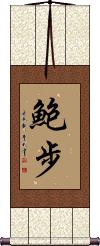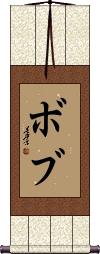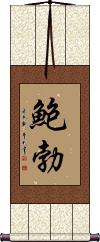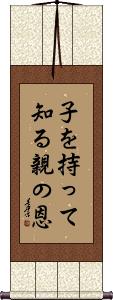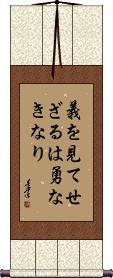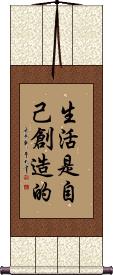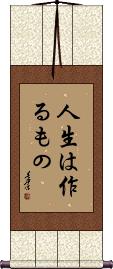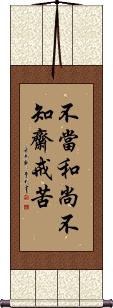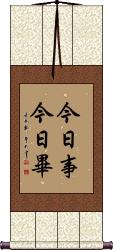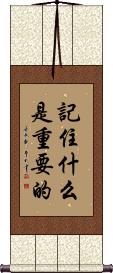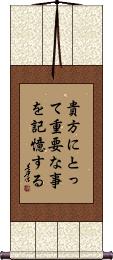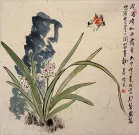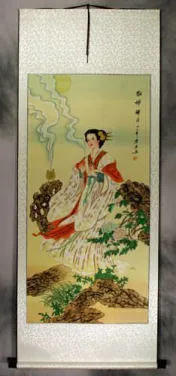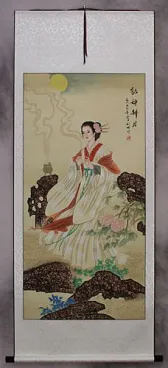Many custom options...
And formats...

Not what you want?
Try other similar-meaning words, fewer words, or just one word.
Bob What in Chinese / Japanese...
Buy a Bob What calligraphy wall scroll here!
Personalize your custom “Bob What” project by clicking the button next to your favorite “Bob What” title below...
Switched to secondary search mode due to lack of results using primary.
These secondary results may not be very accurate. Try a different but similar meaning word or phrase for better results. Or...
Look up Bob What in my Japanese Kanji & Chinese Character Dictionary(My dictionary is a different system then the calligraphy search you just tried)
If you want a special phrase, word, title, name, or proverb, feel free to contact me, and I will translate your custom calligraphy idea for you.
1. Bob
2. No man knows what he owes to his parents until he comes to have children of his own
3. Courage to do what is right
4. Courage To Do What Is Right
6. Life is What You Make of It
8. If you have not been a monk, how can you know what it is like to be a vegetarian?
No man knows what he owes to his parents until he comes to have children of his own
子を持って知る親の恩 literally translates as: Only after you have a baby, you would appreciate your parents (feel the way they do, etc).
This is a bit like the “walk a mile in another man's shoes” saying. Basically, it's about you cannot fully understand the plight of others until you experience it yourself. It also shows appreciation for the plight of parents.
This Japanese proverb can also be translated a few more ways:
No man knows what he owes to his parents till he comes to have children of his own.
One knows not what one owes to one's parents till one comes to have children of one's own.
Only after you have a baby, you will appreciate your parents or feel the way they do.
Only after becoming a parent yourself do you realize how much you owe [how indebted you are] to your own parents.
Note: Because this selection contains some special Japanese Hiragana characters, it should be written by a Japanese calligrapher.
Courage to do what is right
見義勇為 means the courage to do what is right in Chinese.
This could also be translated as “Never hesitate to do what is right.”
This comes from Confucian thought:
Your courage should head in an honorable direction. For example, you should take action when the goal is to attain a just result as, without honorable intent, a person’s gutsy fervor can easily lead them astray.
One who flaunts courage but disregards justice is bound to do wrong; someone who possesses courage and morality is destined to become a hero.
Some text above paraphrased from The World of Chinese - The Character of 勇
See Also: Work Unselfishly for the Common Good | Justice | Bravery
Courage To Do What Is Right
義を見てせざるは勇なきなり is a Japanese proverb that means “Knowing what is right and not doing is a want of courage.”
I've also seen it translated as:
To see what is right, yet fail to do so, is a lack of courage.
To know righteousness, but take no action is cowardice.
You are a coward if you knew what was the right thing to do, but you did not take action.
Knowing what is right without practicing it betrays one's cowardice.
Note: Because this selection contains some special Japanese Hiragana characters, it should be written by a Japanese calligrapher.
Life is What You Make It
Life is What You Make of It
Live for What You Love
人生謳歌 means “live for what you love” in Japanese.
The first two characters mean “human life” or simply “living.” The last two characters mean “merit,” “prosperity,” or “what you enjoy.” This phrase can suggest working or staying busy for your own goals (in your career).
See Also: Prosperity
If you have not been a monk, how can you know what it is like to be a vegetarian?
Only by experiencing hardship will allow you understand the plight of others
不當和尚不知齋戒苦 literally translates as:
[One who has] not been a monk [does not] know the suffering of [being on a] vegetarian diet.
This is a bit like the “walk a mile in another man's shoes” saying. Basically, it's about you cannot fully understand the plight of others until you experience it yourself.
Never put off until tomorrow what you can do today
Remember What Is Important To You
Remember What Is Important To You
This in-stock artwork might be what you are looking for, and ships right away...
Gallery Price: $60.00
Your Price: $36.88
Gallery Price: $60.00
Your Price: $36.88
Gallery Price: $60.00
Your Price: $36.88
Gallery Price: $61.00
Your Price: $33.88
Gallery Price: $61.00
Your Price: $33.88
Gallery Price: $304.00
Your Price: $168.88
Gallery Price: $232.00
Your Price: $128.88
The following table may be helpful for those studying Chinese or Japanese...
| Title | Characters | Romaji (Romanized Japanese) | Various forms of Romanized Chinese | |
| Bob | 鮑步 鲍步 | bào bù / bao4 bu4 / bao bu / baobu | pao pu / paopu | |
| Bob | ボブ | bobu | ||
| Bob | 鮑勃 鲍勃 | bào bó / bao4 bo2 / bao bo / baobo | pao po / paopo | |
| No man knows what he owes to his parents until he comes to have children of his own | 子を持って知る親の恩 | ko wo motte shiru oya no on kowomotteshiruoyanoon | ||
| Courage to do what is right | 見義勇為 见义勇为 | jiàn yì yǒng wéi jian4 yi4 yong3 wei2 jian yi yong wei jianyiyongwei | chien i yung wei chieniyungwei |
|
| Courage To Do What Is Right | 義を見てせざるは勇なきなり | giomitesezaruhayuunakinari giomitesezaruhayunakinari | ||
| Life is What You Make It | 生活是自己創造的 生活是自己创造的 | shēng huó shì zì jǐ chuàng zào de sheng1 huo2 shi4 zi4 ji3 chuang4 zao4 de sheng huo shi zi ji chuang zao de | sheng huo shih tzu chi ch`uang tsao te sheng huo shih tzu chi chuang tsao te |
|
| Life is What You Make of It | 人生は作るもの | jinsei wa tsukuru mono jinseiwatsukurumono | ||
| Live for What You Love | 人生謳歌 | jin sei ou ka jinseiouka jin sei o ka | ||
| If you have not been a monk, how can you know what it is like to be a vegetarian? | 不當和尚不知齋戒苦 不当和尚不知斋戒苦 | bù dāng hé shang bù zhī zhāi jiè kǔ bu4 dang1 he2 shang bu4 zhi1 zhai1 jie4 ku3 bu dang he shang bu zhi zhai jie ku | pu tang ho shang pu chih chai chieh k`u pu tang ho shang pu chih chai chieh ku |
|
| Never put off until tomorrow what you can do today | 今日事今日畢 今日事今日毕 | jīn rì shì jīn rì bì jin1 ri4 shi4 jin1 ri4 bi4 jin ri shi jin ri bi jinrishijinribi | chin jih shih chin jih pi chinjihshihchinjihpi |
|
| Remember What Is Important To You | 記住什么是重要的 记住什么是重要的 | jì zhù shén shì zhòng yào de ji4 zhu4 shen2 me shi4 zhong4 yao4 de ji zhu shen me shi zhong yao de jizhushenmeshizhongyaode | chi chu shen me shih chung yao te | |
| Remember What Is Important To You | 貴方にとって重要な事を記憶する | anata ni totte jyuyou na koto wo kioku suru anata ni totte jyuyo na koto wo kioku suru | ||
| In some entries above you will see that characters have different versions above and below a line. In these cases, the characters above the line are Traditional Chinese, while the ones below are Simplified Chinese. | ||||
Successful Chinese Character and Japanese Kanji calligraphy searches within the last few hours...
